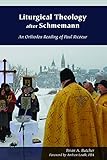Liturgical Theology after Schmemann : An Orthodox Reading of Paul Ricoeur / Brian A. Butcher.
Material type: TextSeries: Orthodox Christianity and Contemporary ThoughtPublisher: New York, NY : Fordham University Press, [2018]Copyright date: ©2018Description: 1 online resource (336 p.)Content type:
TextSeries: Orthodox Christianity and Contemporary ThoughtPublisher: New York, NY : Fordham University Press, [2018]Copyright date: ©2018Description: 1 online resource (336 p.)Content type: - 9780823278275
- 9780823278299
- 264/.019001 23
- BX350 .B873 2018
- online - DeGruyter
- Issued also in print.
| Item type | Current library | Call number | URL | Status | Notes | Barcode | |
|---|---|---|---|---|---|---|---|
 eBook
eBook
|
Biblioteca "Angelicum" Pont. Univ. S.Tommaso d'Aquino Nuvola online | online - DeGruyter (Browse shelf(Opens below)) | Online access | Not for loan (Accesso limitato) | Accesso per gli utenti autorizzati / Access for authorized users | (dgr)9780823278299 |
Frontmatter -- Contents -- Foreword -- Introduction -- PART I: "HOW WILL THE LAMP ENLIGHTEN THE LIGHT?" -- 1 " After Schmemann": Introducing Ricoeur into the Conversation -- 2 Western Perspectives -- PART II: "NO TONGUE CAN HYMN YOUR WONDERS" -- 3 Meaning in/and Metaphor -- 4 At the Intersection of the Via Positiva and the Via Negativa -- PART III: "TODAY YOU HAVE APPEARED TO THE WORLD" -- 5 "The Summoned Subject" -- 6 Truth as Attestation -- 7 Liturgical Time, Narrative, Memory, and History -- PART IV: "THE VOICE OF THE LORD CRIES OUT UPON THE WATERS" -- 8 Manifestation and Proclamation -- Conclusion -- Appendix: "Service of the Great Blessing of the Waters" -- Acknowledgments -- Notes -- Bibliography -- Index
restricted access online access with authorization star
http://purl.org/coar/access_right/c_16ec
While only rarely reflecting explicitly on liturgy, French philosopher Paul Ricoeur (1913-2005) gave sustained attention to several themes pertinent to the interpretation of worship, including metaphor, narrative, subjectivity, and memory. Inspired by his well-known aphorism, "The symbol gives rise to thought," Liturgical Theology after Schmemann offers an original exploration of the symbolic world of the Byzantine Rite , culminating in a Ricoeurian analysis of its Theophany "Great Blessing of Water." . The book examines two fundamental questions: 1) what are the implications of the philosopher's oeuvre for liturgical theology at large? And 2)how does the adoption of a Ricoeurian hermeneutic shape the study of a particular rite? Taking the seminal legacy of Orthodox theologian Alexander Schmemann (1921-1983) as its point of departure, Butcher contributes to the renewal of contemporary Eastern Christian thought and ritual practice by engaging a spectrum of current theological and philosophical conversations.
Issued also in print.
Mode of access: Internet via World Wide Web.
In English.
Description based on online resource; title from PDF title page (publisher's Web site, viewed 02. Mrz 2022)


